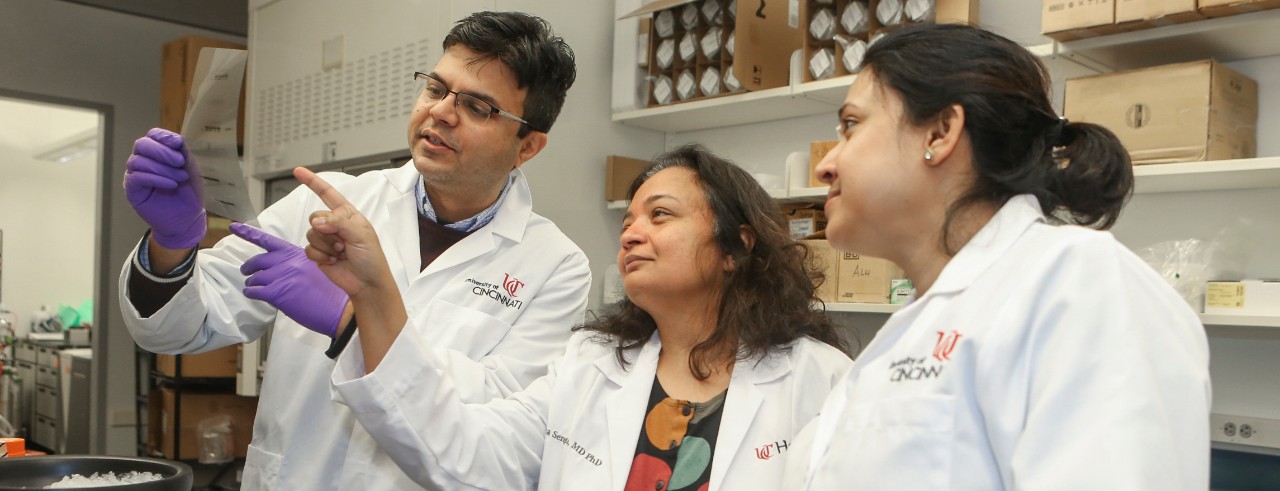
Study reveals potential new treatment for patients with melanoma
A pilot study shows that radiation therapy before immunotherapy may prolong lives of patients
Researchers at the University of Cincinnati, in partnership with Emory University, have uncovered a potentially more beneficial treatment regimen for patients with metastatic melanoma.
The results, published in the International Journal of Radiation Oncology, Biology and Physics, show that radiation before immunotherapy may prolong lives of patients with melanoma that has spread to the brain.
“Melanoma brain metastases occur in more than 50% of melanoma patients,” says corresponding author Dr. Soma Sengupta, associate professor of neurology at UC, UC Health physician and co-director of the UC Gardner Neuroscience Institute’s Brain Tumor Center. She is also the inaugural recipient of the Harold C. Schott Endowed Chair of Molecular Therapeutics.
“While both radiation therapy and ‘immune checkpoint inhibitors,’ a form of immunotherapy, are used alone or in combination for treatment of this cancer, the role of combination therapies and how these treatments could best be sequenced remains unclear,” Sengupta adds.
Immunotherapy is a type of cancer treatment that boosts the body's natural defenses to fight cancer. It uses substances made by the body or in a laboratory to improve or restore immune system function and may work by stopping or slowing the growth of cancer cells. Immune checkpoint inhibitors work by blocking checkpoint proteins from binding with their partner proteins. This prevents the “off” signal from being sent, allowing the T-cells to kill cancer cells.

Dr. Soma Sengupta and Daniel Krummel with members of their lab in the Vontz Center for Molecular Studies. Photo credit: Joe Fuqua / UC Creative Services
In this study, the team conducted a retrospective analysis of patients with surgically removed melanoma brain metastases who underwent treatment with either radiation, immunotherapy or a combination of both between 2010 and 2018. Of 79 specimens, only 17 samples were eligible for this study.
“Among the latter, we specifically investigated the gene expression between patients who received radiation therapy first then immune checkpoint inhibitors in comparison to the reverse,” says Daniel Pomeranz Krummel, research associate professor of neurology at UC and lead author of the paper. “We used a melanoma brain metastases animal model for validation experiments, as well.”
Pomeranz Krummel says results showed that the combination of radiation therapy and immune checkpoint inhibitors correlated to better patient survival when compared to radiation therapy alone.
“Specifically, we found that radiation followed by immunotherapy was superior compared to immunotherapy followed by radiation therapy,” he says, adding that his observation in patients was also observed in the melanoma animal model. “More genetic analysis of the tissue revealed that radiation therapy followed by immunotherapy showed that genes causing cell death signaling, usually fighting the cancer, were restricted and key indicators of inflammation were present.”
“Our study provides initial insights into the optimal sequence of treatment following surgical removal of melanoma brain metastases,” adds Sengupta, noting that this was a small sample of patients and that follow up studies are needed. “Clinical trials examining the best sequence of these treatments are necessary.”
Next Lives Here
The University of Cincinnati is classified as a Research 1 institution by the Carnegie Commission and is ranked in the National Science Foundation's Top-35 public research universities. UC's graduate students and faculty investigate problems and innovate solutions with real-world impact. Next Lives Here.
This research was a collaboration with the Winship Cancer Institute at Emory University. Financial support for this research came, in part, from the National Institutes of Health-National Institute of Neurological Disorders and Stroke (NS083626), the Melanoma Fund, Winship Cancer Institute at Emory University and the Schott Chair for Molecular Therapeutics, University of Cincinnati. Researchers report no conflict of interest.
Related Stories
It’s a mindset: Meet the visionaries redefining innovation at...
December 20, 2024
Innovation is being redefined by enterprising individuals at UC’s 1819 Innovation Hub. Meet the forward thinkers crafting the future of innovation from the heart of Cincinnati.
UC students well represented in this year’s Inno Under 25 class
December 20, 2024
Entrepreneurialism runs through the veins of University of Cincinnati students, as confirmed by the school’s strong representation in this year’s Inno Under 25 class.
UC professor Ephraim Gutmark elected to National Academy of...
December 20, 2024
Ephraim Gutmark, distinguished professor of aerospace engineering at the University of Cincinnati, was elected to the 2024 class of the prestigious National Academy of Inventors.
